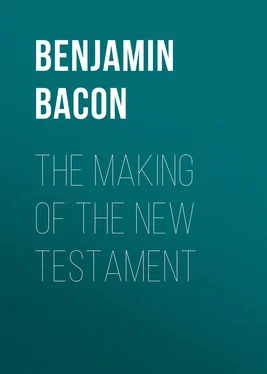Benjamin Bacon - The Making of the New Testament
Здесь есть возможность читать онлайн «Benjamin Bacon - The Making of the New Testament» — ознакомительный отрывок электронной книги совершенно бесплатно, а после прочтения отрывка купить полную версию. В некоторых случаях можно слушать аудио, скачать через торрент в формате fb2 и присутствует краткое содержание. ISBN: , Жанр: foreign_antique, foreign_prose, на английском языке. Описание произведения, (предисловие) а так же отзывы посетителей доступны на портале библиотеки ЛибКат.
- Название:The Making of the New Testament
- Автор:
- Жанр:
- Год:неизвестен
- ISBN:http://www.gutenberg.org/ebooks/39288
- Рейтинг книги:5 / 5. Голосов: 1
-
Избранное:Добавить в избранное
- Отзывы:
-
Ваша оценка:
- 100
- 1
- 2
- 3
- 4
- 5
The Making of the New Testament: краткое содержание, описание и аннотация
Предлагаем к чтению аннотацию, описание, краткое содержание или предисловие (зависит от того, что написал сам автор книги «The Making of the New Testament»). Если вы не нашли необходимую информацию о книге — напишите в комментариях, мы постараемся отыскать её.
The Making of the New Testament — читать онлайн ознакомительный отрывок
Ниже представлен текст книги, разбитый по страницам. Система сохранения места последней прочитанной страницы, позволяет с удобством читать онлайн бесплатно книгу «The Making of the New Testament», без необходимости каждый раз заново искать на чём Вы остановились. Поставьте закладку, и сможете в любой момент перейти на страницу, на которой закончили чтение.
Интервал:
Закладка:
It is long before the sense of present inspiration, both in word and work is lost; still longer before the recorded precepts of Jesus, the exhortations and directions of apostles, the visions of "prophets," come to take their place alongside the Bible of the synagogue as "writings of the new covenant." Melito of Sardis ( c. 170) is the first to use this expression, and even in his case it does not bear the sense of a canon with definite limits. Tertullian (200-210) is the first to place a definite "New Testament" over against the Old. We must glance at some of the intermediate steps to appreciate this gradual process of canonization.
At first there is no other 'Scripture' than the synagogue's. Clement of Rome (95) still uses only the Law and the Prophets (including certain apocrypha now lost) as his Bible. He refers to the precepts of Jesus (quoted as in Acts xx. 35 from oral tradition), with the same sense as Paul of their paramount authority, and bids the Corinthians whom he addresses give heed to what the blessed Apostle Paul had written to them "in the beginning of the gospel service," to warn them against factiousness. Nor has Clement yet lost the sense of direct inspiration; for he attaches to his own epistle, written in behalf of the church at Rome, the same superhuman authority claimed in Acts xv. 28 for the letter sent by the church at Jerusalem. If the Corinthians disregard the "words spoken by God through us" they will "incur no slight transgression and danger," for these warnings of a sister church are uttered in the name and by inspiration of the Holy Ghost. Still, Clement does not dream of comparing his authority, even when he writes as agent of the church, with that of "the oracles of the teaching of God," the "sacred Scriptures," the "Scriptures which are true, which were given through the Holy Ghost, wherein is written nothing unrighteous or counterfeit." He does not even rank his own authority with that of "the good apostles, Peter and Paul."
Ignatius, bishop of Antioch, transported to Rome for martyrdom in 110-117, employs a brief stay among the churches of Asia to exhort them to resist the encroachments of heresy by consolidation of church organization, discipline, strict obedience to the bishop. Ignatius, too, still feels the afflatus. His message, he declares with emphasis, was revealed to him, together with the occasion for it, directly from heaven. It was "the voice of God and not only of a man" when he cried out among the Philadelphians: "Give heed to the bishop, and the presbytery and deacons." Yet Ignatius cannot enjoin the Romans as Peter and Paul did. They were "apostles." He is "a convict." His inspiration, however undoubted, is of a lower order.
Hermas, a 'prophet' of the same Roman church as Clement, though a generation later, is still so conscious of the superhuman character of his "Visions," "Parables," and "Mandates" that he gives them out for circulation as inspired messages of the Spirit; and this not for Rome alone. Clement, then apparently still living, and "the one to whom this duty is committed," is to send them "to foreign cities." In point of fact the Shepherd of Hermas long held a place for many churches as part of the New Testament canon. Yet less than a generation after Hermas, the claim to exercise the gift of prophecy in the church was looked upon as dangerous if not heretical.
In the nature of the case it was really impossible that the original sense of endowment with "the Spirit" should survive. Not only did the rapidly growing reverence for the apostles and the Lord open a chasm separating "the word of wisdom and the word of power" given to that age, from the slighter contemporary claims of miracle and revelation; the very growth and wide dissemination of the gospel message made standardization imperative. Before the middle of the second century Gnostic schism had swept nearly half the church into the vortex of speculative heresy. Marcion at Rome ( c. 140) carried Pauline anti-legalism to the extreme of an entire rejection of the Old Testament. Judaism and all its works and ways were to be repudiated. The very God of Abraham, Isaac, and Jacob was declared other than, and ignorant of, the "heavenly Father" of Jesus. Against such vagaries there must be some historic standard. Even Marcion himself looked to the past, however recent, as the source of light, and since some written standard must be found, it was he, the heretic, who gave to Christianity its first canon of Christian writings. The Marcionite churches did away with the public reading of the Law and the Prophets, and could only put in their place "Gospel" and "Apostle." Not that Epistles, Gospels, and even 'Revelations' were not also in use among the orthodox; but they are not yet referred to as 'Scripture.' Even gospels are treated merely as aids to the memory in transmitting the teaching of the Lord. This teaching itself is but the authoritative interpretation of Law and Prophets, and is in turn interpreted by the writings of the apostles.
Marcion's 'Gospel' consisted of our Luke, expurgated according to his own ideas. His 'Apostle' contained the Epistles of Paul minus the Pastoral Epistles and a series of passages cancelled out from the rest as Jewish interpolations. This was the first Christian Bible distinct from 'the Scriptures' of the synagogue.
Indirectly the growth of Gnostic heresy contributed still more to the increasing authority of apostolic and quasi-apostolic writings. One of its earliest and most obnoxious forms was called 'Doketism,' from its exaggeration of Paulinism into a complete repudiation of the historic Jesus, whose earthly career was stigmatized as mere 'phantasm' ( dokesis ). Doketism is known to us not only through description by orthodox opponents, but by a few writings of its own. It is the type of heresy antagonized in the Johannine Epistles ( c. 100) and in those of Ignatius (110-117). Now Ignatius, as we have seen, relied mainly on church organization and discipline. The Pastoral Epistles (90-100), while they emphasize also "the form of healthful words, even the words of our Lord Jesus" take, on the whole, a similar direction. But 1st John, which relies far less than the Pastoral Epistles or Ignatius on mere church organization, is also driven back upon the life and teaching of Jesus as the historic standard. It does , therefore, make formal appeal to the sacred tradition in both its elements, but with a difference characteristic of the Pauline spirit. The redeeming life and death of Jesus are viewed as a manifestation of "the life, even the eternal life (of the Logos) which was with the Father and was manifested unto us" (the historic body of believers). Again Jesus' one "new commandment," the law of love, is the epitome of all righteousness.
In his doctrine of Scripture as in many other respects the Johannine writer shows a breadth and catholicity of mind which almost anticipates the development of later ages. His task was in fact the adjustment of the developed Pauline gospel to a type of Christianity more nearly akin to synagogue tradition. This type had grown up under the name of Peter. On the question of the standard of written authority 'John' 2 2 In using traditional names and titles such as "Luke," "John," "Matthew," "James," no assumption is made as to authenticity. The designation is employed for convenience irrespective of its critical accuracy or inaccuracy.
leaves room for the freedom of the Spirit so splendidly set forth in the teaching and example of Jesus and Paul, while he resists the erratic licence of "those that would lead you astray." The result is a doctrine of historic authority in general, and of that of the Scriptures in particular, sharply differentiated from the Jewish, and deserving in every respect to be treated as the basis of the Christian. In a great chapter of his Gospel (John v.), wherein Jesus debates with the scribes the question of His own authority, the dialogue closes with a denunciation of them because they search the Scriptures with the idea that in them they have eternal life, that is, they treat them as a code of precepts, obedience to which will be thus rewarded. On the contrary, says Jesus, the Scriptures only "bear witness" to the life that is present in Himself as the incarnate, eternal, Word; "but ye will not come unto me that ye might have life."
Интервал:
Закладка:
Похожие книги на «The Making of the New Testament»
Представляем Вашему вниманию похожие книги на «The Making of the New Testament» списком для выбора. Мы отобрали схожую по названию и смыслу литературу в надежде предоставить читателям больше вариантов отыскать новые, интересные, ещё непрочитанные произведения.
Обсуждение, отзывы о книге «The Making of the New Testament» и просто собственные мнения читателей. Оставьте ваши комментарии, напишите, что Вы думаете о произведении, его смысле или главных героях. Укажите что конкретно понравилось, а что нет, и почему Вы так считаете.












